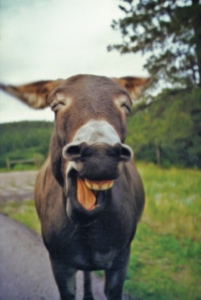In the last few weeks, more than ever before, I am convinced that the scientific name for humankind lacks something as a descriptor. Homo sapiens. Wise (or rational) man. Yeah, right.
It was invented by the father of modern taxonomy, the man who invented our double-worded system of naming biological species, the Swedish zoologist Carl von Linne. He was one of Europe’s most acclaimed scientist in the mid 18th century, and his influence was such that the name has stuck despite all the evidence that we people keep providing that we are not all that wise.
As it happens, there are a number of other candidate descriptors – some serious; some not so much.
 A species name should be something unique to the species; some identifying characteristic that sets that species apart from others. Felix domesticus is the domestic cat. Dendrobates azureus, a certain type of tree frog, is blue tree walker.
A species name should be something unique to the species; some identifying characteristic that sets that species apart from others. Felix domesticus is the domestic cat. Dendrobates azureus, a certain type of tree frog, is blue tree walker.
So what are our identifying characteristics as a species?
Creativity, aesthetics, language, and laughter all seem to be good candidates.
Creativity and a love of beauty
 We have only to look around at the sheer joyful profligacy of the natural world to see that creativity seems to be built into us, showing up as soon as we are old enough to start decorating ourselves and our environment. Homo creator?
We have only to look around at the sheer joyful profligacy of the natural world to see that creativity seems to be built into us, showing up as soon as we are old enough to start decorating ourselves and our environment. Homo creator?
But other animals use tools, and other animals make things. It’s impossible to say whether they enjoy doing so, although some suggest they only do so when they have another end in view. An ape tears a stick to the right length in order to insert it in a termite mound and extract breakfast. A bower bird spends hours creating an ornate pattern in order to attract a mate.
People make things for the sheer pleasure of creation. The creative impulse seems to be more highly developed in our species; so highly developed that creation itself becomes a motivator. But undoubtedly the seeds of the impulse are found in other species.
Aesthetics is another suggested separator, which would make us homo aestheticus. We take pleasure in beautiful things to see, to hear, to taste, to smell, and to touch. Is this our unique characteristic? I think not. We see in other animals a pleasure in sights, sound, tastes, smells, and touch that we would call aesthetic if the perceiver were human. More highly developed in humans? Perhaps so. But again, not unique.
The hominid that talks?
For a long time, the ability to communicate was suggested as the strongest difference between us and the rest of creation. Communication is a powerful human drive. Are we homo loquens – talking man? But two types of research have narrowed the gap with the other animals. On the one hand, animals have been taught to understand human languages, and even to communicate in a human language (sign). On the other, animal studies have shown that complex messages are passed between animals of the same species, and some messages are even understood across species. We have a spoken language that is (mostly) under our voluntary control, but this is still a matter of degree rather than type.
 What about homo ridens, the animal that laughs? We have a sense of humour. But so do dogs and other domestic animals (ask anyone who owns donkeys).
What about homo ridens, the animal that laughs? We have a sense of humour. But so do dogs and other domestic animals (ask anyone who owns donkeys).
Other contenders are homo amans – humans as loving agents, or homo generosus – generous man. Certainly these are defining characteristics of humans at their best. But unique? I don’t think so.
The meaning seekers
I like homo poetica – the hominid that searches for meaning and significance. This is certainly a strong identifier of humankind. The search for meaning and significance has built societies and civilisations. As a scientific name, it works. But I think there is one that is even more descriptive.
I have been in a conference for the past two days, listening to speaker after speaker. And the best of them, the ones who captured and held our attention, even at the end of two days after lots of coffee and little sleep, were those who offered beautiful presentations, interesting use of language, humour, generous sharing of their experience and knowledge in a way that helped us to make meaning out of our own—and one more thing. They told us stories.
That, I think, is the unique identifier. We are the animal – the only animal as far as we know – that tells stories. We use stories to build empathy, to share as knowledge, to explain meaning, to identify as a group.
I’m a Catholic Christian, and I see this pre-eminently in the public life of Jesus. He didn’t content himself with saying ‘do this,’ or ‘this means that’. Instead, he told stories that carried the message people needed to hear. We’re still mining those stories for meaning 2000 years later. But I also see it in the 2000 years following. Whenever the Church needed a new way of doing things, or a reminder of an old way, God sent us a saint to be a living story, showing us the lesson we needed to learn.
To my mind, we are homo narans, the storytelling hominid. What do you think?




